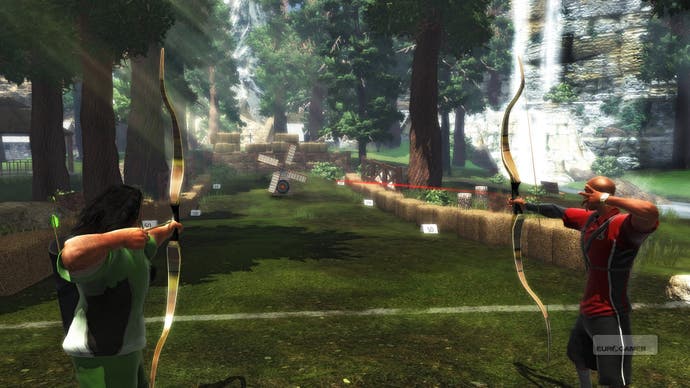PlayStation Move: Sports Champions
A chat with producer Olivier Banal.
Never mind all that general election nonsense - this year's real battle for hearts and minds is being fought by Sony and Microsoft. The platform holders are going head-to-head, clashing over whether virtual pre-pubescent boys and invisible steering wheels are better than magic colour-changing ping pong balls on sticks. Makes a change from tax breaks and immigration, anyway.
The fight is set to really heat up this June when both parties show off their wares at E3, but the campaign has already started in earnest. Sony laughed in the face of volcanic ash last week and held an event at a swank hotel in London to show off new motion controller PlayStation Move.
The code on display was pretty much the same as what was shown back in March, so read our GDC hands-on preview for the lowdown. Developers there to demo the games included Olivier Banal, European producer on Sports Champions (you know, the one with the gladiators and the table tennis). Eurogamer sat down with him for a chat - read on to find out how the game's coming along and why it's not just another mini-game compilation, honest.
It's a sports simulation. It replicates real-life sports as well as not-so-real-life sports, like gladiator duels. You act out the sport just as you would do in real-life, and the Move controller tracks your motions. So throwing a frisbee, swinging a bat, throwing a ball, shooting arrows... Things like that.
It's a collection of events. We don't really like the term 'mini-game' because the game mechanics are very accurate and precise. There's a big learning curve if you want to master the events.
But the aim is for anyone to be able to play, whether they've never played table tennis before, say, or want a really accurate simulation. For that we've got different difficulty levels. The aim now is to balance the game so it's more forgiving for players who aren't so skilled, and very accurate for those who get a really good handle on it.
Replicating a real-life discipline with a very accurate motion controller is a bit of a double-edged sword. It's very good at replicating what you're doing, regardless of whether you're doing it right or wrong.

That's where the different difficulty levels come in. The easier levels will fine-tune what you're doing - for example, in table tennis, to make sure you hit the ball back over the net and on the table. At the other end of the spectrum, you get more control over the ball but you're also more likely to hit the net or hit it wide.
You can adapt the difficulty levels to individual players. So if you're playing table tennis with your mum, you can set the level to easy for her and normal for you, and play against each other like that.


